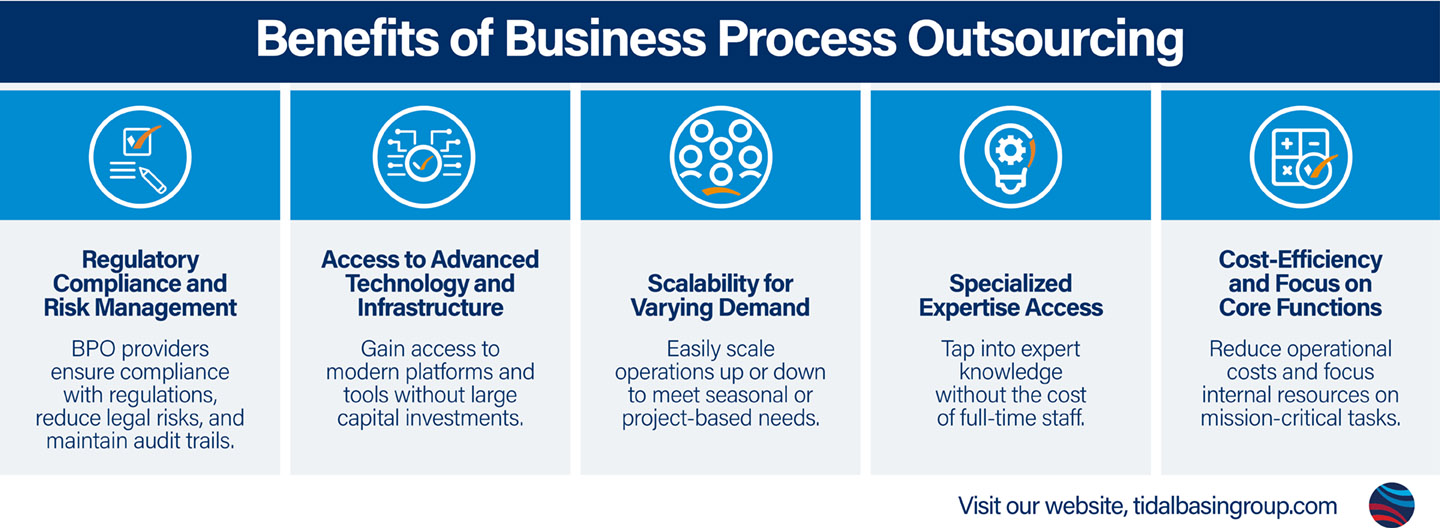Government agencies and enterprise organizations face mounting pressure to deliver better services while managing tighter budgets and increasing regulatory requirements. State, county, and municipal governments must balance citizen expectations with fiscal responsibility.
With business process outsourcing (BPO), organizations can streamline processes, cut costs, and enhance operational efficiency by delegating specific tasks to external experts.
But what exactly is BPO, and why has it become a key strategy across so many industries? This guide explores its definition, applications, and measurable benefits, with a special focus on how it supports government agencies and emergency management teams.
What is Business Process Outsourcing?
Business process outsourcing is the practice of contracting external service providers to handle specific operational tasks that are not central to a business’s core objectives. Think of call center management, payroll processing, IT support, and other back-office activities.
Unlike traditional outsourcing for one-off tasks, BPO is often strategic and long-term. It’s designed to help organizations focus on core missions by delegating time-consuming, repetitive, or highly technical processes to specialized external teams.
Sectors That Benefit
Businesses across sectors, such as healthcare, retail, government, and tech, are leveraging BPO. Emergency managers, for example, can outsource tasks like contact center support during disasters, which frees internal teams to tackle high-priority work in real-time.
Why Organizations Use Business Process Outsourcing

The decision to outsource business processes in the government sector stems from several factors that extend beyond cost considerations.
Regulatory Compliance and Risk Management
Government entities and enterprises operate in highly regulated environments where compliance failures can result in significant penalties, legal exposure, and reputational damage. Professional BPO providers specializing in these sectors invest heavily in compliance infrastructure and expertise.
These providers implement quality control processes, maintain audit trails, and provide compliance reporting that individual agencies would find difficult to replicate internally.
Access to Advanced Technology and Infrastructure
Government agencies and large enterprises may struggle with legacy systems and limited technology budgets. BPO providers can offer access to modern technology platforms without requiring significant capital investments.
Cloud-based solutions, advanced analytics platforms, and cybersecurity infrastructure represent major investments that BPO providers spread across multiple clients. For example, a county government outsourcing its IT help desk gains access to enterprise-grade ticketing systems, remote support tools, and security monitoring that would be prohibitively expensive to implement independently.
Scalability for Varying Demand
Government services and enterprise operations often experience significant demand fluctuations. Tax season creates massive spikes in processing requirements for revenue departments. Open enrollment periods overwhelm HR departments.
BPO providers can scale capacity up or down based on demand without the challenges of hiring and laying off permanent staff. This flexibility is particularly valuable for government entities that face budget constraints and political scrutiny around staffing decisions.
Specialized Expertise Access
Many government functions and enterprise processes require specialized knowledge that’s expensive to maintain internally. Legal research, financial analysis, cybersecurity, and regulatory compliance represent areas where outsourcing can provide superior expertise at a lower cost.
A municipal government might need specialized expertise in bond issuance, environmental compliance, or economic development. Maintaining this expertise internally for occasional use is inefficient. Outsourcing provides access to specialists when needed without the overhead of permanent staff.
Why is BPO Significant for Emergency Management?
Emergency management is a high-stakes environment. When lives and communities are on the line, decisions need to be fast and effective. Here are actionable ways Business Process Outsourcing (BPO) helps in emergency management settings:
Call Center Support
When public emergencies like natural disasters or pandemics strike, the increase in volume of calls can overwhelm internal teams. Outsourcing customer service or information dissemination to BPO providers ensures timely responses and accurate information delivery.
Data Analysis and Crisis Monitoring
Emergency responses rely heavily on accurate, up-to-date data. BPO providers use advanced tools to monitor data streams, such as social media sentiment, weather predictions, and medical supply metrics, helping officials make informed decisions.
Resource Allocation
From staffing vaccination centers to distributing relief materials, BPO helps streamline logistical planning and execution for major crises.
Common Misconceptions About BPO
Business process outsourcing has evolved significantly over the past two decades, yet many organizations still hesitate to adopt it due to persistent myths and misunderstandings.
These misconceptions can prevent government agencies and enterprises from leveraging a tool that could dramatically improve service delivery, compliance, and efficiency. Here are some of the most common misconceptions and the realities behind them.
“Outsourcing Means Losing Control of Operations”
Leaders often worry that handing off critical functions will compromise their ability to oversee performance, ensure quality, or respond to emerging needs.
In reality, today’s BPO relationships are governed by detailed service-level agreements (SLAs), robust compliance structures, and frequent reporting. Modern providers offer real-time dashboards, performance metrics, and collaborative engagement models.
Far from losing control, agencies often gain visibility into operations they previously lacked the tools or bandwidth to monitor closely.
“BPO is Only for Large Corporations with Massive Budgets”
While multinational corporations were early adopters of BPO, the model has become highly adaptable and modular.
Many providers offer scalable solutions designed specifically for mid-sized enterprises and government agencies at the state, county, or municipal level.
Whether it’s outsourcing a single process, like payroll, entire functional areas like IT support or call center operations, BPO can be tailored to the needs and budgets of smaller organizations without compromising quality or control.
“BPO is Inflexible and Hard to Unwind”
Some organizations believe that once a process is outsourced, reversing that decision is difficult or impossible. However, modern contracts are often structured with flexibility and offboarding in mind.
Phased engagements, performance checkpoints, and built-in transition plans make it easier to scale services up or down, or bring them back in-house without disruption
With the right partner and governance in place, outsourcing can enhance, not hinder operational effectiveness, accountability, and public trust.
What’s Next for Organizations Considering BPO?
Governments and emergency management teams that tap into outsourcing gain strategic advantages, from improved operational agility to substantial cost savings.
Interested in seeing how BPO can streamline your operations? Contact us to learn more about tailored outsourcing solutions that meet the unique challenges of your sector.



